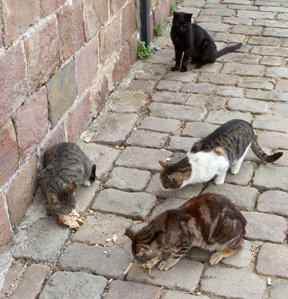Stalled by the former council, the proposed animal control ordinance that would provide a trap, neuter and release program to deal with feral cats once more reared its head in a sharp discussion during the public comment portion of the Sept. 22 city council meeting.
Mayor Mark Smith established a committee last month to evaluate the counter claims over the merits of the program.
Kathleen Henderson, founder of the Feral Cat Foundation, said claims that cats pose a health risk to the public are without merit.
“Feral cats avoid people,” she said. “They do not leap out and attack people.”
Opponents to the ordinance had presented arguments to the contrary, often citing unreliable sources for their information. The city has bolstered its arguments against the ordinance with reports from the state’s agencies overseeing hunting and PETA, a radical animal rights group, both of whom claim the TNR program doesn’t work or deter diseases generated by feral cats.
Privately, city officials, however, said the issue is less human health as it is property rights and who will oversee the program.
“They are not going away, and we’re not going to let them starve.” – Kathleen Henderson
________
“We are not going to allow that to happen,” said Council President Terrance Ruane, who said the council is trying to look all sides in the matter.
Are feral cats a risk to public health?
The ordinance would have required approved caregivers and/or shelters in the city to capture, neuter, vaccinate, and return the cats to the streets where they would be monitored for future health problems.
In August, Mayor Smith cited expert advice from two state authorities that opposed the feeding of cats, saying these cats pose a danger to birds and others.
A feral cat is one that is born and raised in the wild or has been abandoned or lost to revert to wild ways in order to survive. Feral cats often live in groups, called colonies, and take refuge wherever they can find food—rodents and other small animals and garbage. They will also try to seek out abandoned buildings, deserted cars, even dig holes in the ground to keep warm in winter months and cool during the summer heat.
Critics have claimed that feral cats can be a risk to human health, laying out a range of diseases and bacterial risks these cats can poise and that cat colonies should be “removed,” and which under the current system employed by the Newark shelter to which the animals would be sent, means extermination. Under the exiting program, animal control officers are called to pick up wild cats which are euthanized after seven days if they are not adopted and feral cats are almost never adopted.
Property value issue
City officials behind the scenes say the debate is more about property than about public health, and that many homeowners do not want to have their properties overrun by stray cats living in colonies nearby. While there is significant debate over whether or not cat feces causes serious disease in humans, it is unsightly, and often leaves a strong stench, especially when there are a lot of cats in a colony.
Some believe feral cats can be relocated, but the question would be where to take them? Some homeowners in private want the city to exterminate them, seeing them as little more than rodents.
Henderson and other supporters of the ordinance claim that the program works as the only humane way to control the feral cat population. She said the alternative would be large scale killing of cat populations, which the city is not in a financial position to accomplish, and even this would not solve the problem since the cats would continue to breed. She said health officials in Bayonne have told her simply to stop feeding the cats and that these would go away.
“They are not going away, and we’re not going to let them starve,” she said, “no manner how many summons the city issues.”
Under current regulations, cats collected and brought to a shelter in Newark are euthanized if not adopted within a few weeks. Feral cats rarely make the transition except as kittens so most that are captured under existing regulations are killed eventually.
The debate comes at a time when Henderson and others claim someone may be killing cats in several parts of the city, a matter currently under investigation by state Attorney General’s office.
